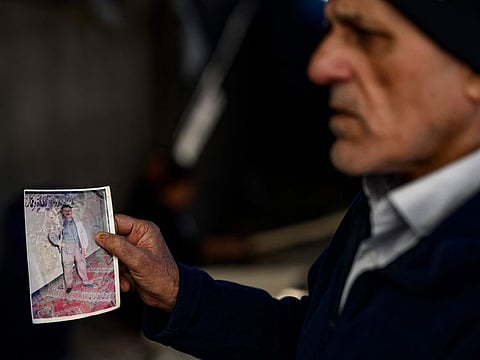‘It was like being in a coffin’: How Turkish man survived 20 years of hell in Syria’s notorious prison
My family thought I was dead, says 53-year-old, whose face makes him look 20 years older

MAGARACIK, Turkey: Finally home in Turkey, Mehmet Erturk cannot eat the bread his wife has made him. After 20 years jailed in Syria, half his teeth are missing and the other half are threatening to fall out.
“It was torture after torture,” he told AFP, miming the truncheon blows to the mouth the guards would give him at a notorious Damascus prison known as the Palestine Branch, where he spent part of his time incarcerated.
Arrested in 2004 for smuggling, Erturk finally made it back to his home to Magaracik on Monday evening, a village perched at the top of a winding road dotted with olive trees some 10 minutes from the Syrian border.
“My family thought I was dead,” said the 53-year-old, whose face and manner of walking make him look 20 years older.
On the night of his release, he heard gunshots and began to pray.
“We didn’t know what was happening outside. I thought I was finished,” he said.
Then he heard loud hammer blows and within minutes the prison gates were flung open by the rebels who ousted Bashar Al Assad.
From torture to freedom
Mehmet Erturk’s Return: After spending 20 years in a Syrian prison, Mehmet Erturk has returned to his home village, Magaracik, Turkey. Arrest and Imprisonment: Erturk was arrested in 2004 for smuggling and sentenced to 15 years. He was held in the notorious Palestine Branch prison in Damascus, known for extreme brutality. Torture and Inhumane Conditions: Guards used truncheons to beat prisoners, causing Erturk to lose most of his teeth. Other methods of torture included hammer blows, boiling water burns, and overcrowded cells. Cells designed for 20 held over 100 inmates, and many died from starvation or lack of medical care. Dead bodies were disposed of in garbage skips. Family’s Reaction: His wife and family believed he was dead after years of no contact. His youngest daughter was six months old when he was arrested. Release from Prison: He was freed when rebels ousted Syrian President Bashar Al Assad and broke open the prison gates. Erturk initially thought the commotion was the prelude to his death. Health Consequences: Erturk is physically and mentally scarred from his imprisonment. He looks much older than his 53 years, and his body shows signs of long-term abuse, such as chain scars. Loss of Friends and Fellow Prisoners: Many prisoners, including his close friend Faruk Karga, died of starvation in the prison. Erturk’s Gratitude: He expressed deep gratitude to Turkish President Recep Tayyip Erdogan for facilitating his return. Erturk believes his Turkish nationality led to harsher treatment in prison due to Erdogan’s stance against Assad. Broader Context: Erturk’s story highlights the brutality of Syria’s prison system, which has claimed the lives of over 105,000 people since the start of the war in 2011, according to the Syrian Observatory for Human Rights.
‘Like being in a coffin’
“We hadn’t seen him for 11 years. We had no hope,” admitted his wife Hatice, sitting cross-legged outside their home preparing bread with their youngest daughter, who was barely six months old when her father was arrested.
After he was sentenced to 15 years, the prison authorities left this father-of-four to languish in an underground dungeon, at the mercy of brutal guards.
“Our bones would pop out of the socket when they hit our wrists with hammers,” he said.
“They also poured boiling water down the neck of one prisoner. The flesh from his neck just slid all the way down” to his hips, he said.
Pulling up his right trouser leg, he shows his right ankle, the skin darkened by the chain he wore.
“During the day, it was strictly forbidden to talk... there were cockroaches in the food. It was damp, it stank like a toilet,” he said, recalling days “without clothes or water or food”.
“It was like being in a coffin.”
And there was huge overcrowding.
‘Threw the dead into skips’
“They put 115, 120 people in a cell for 20 people. Many people died of starvation,” he said.
And the guards just “threw the dead into rubbish skips”.
Erturk said he paid the price for the hatred Syria’s authorities bore for Turkish President Recep Tayyip Erdogan, who early in the war urged Assad to leave.
“We Turks suffered a lot of torture for that,” he told AFP, saying he was refused medication on grounds of his nationality.
He sank so low he even hoped they would hang him.
“They were taking us to a new prison block and I saw a rope hanging from the ceiling and I said: ‘Thank God, I’m saved’,” he said.
As he recounted the horrors, he often broke off to thank “our dear president Erdogan” for him being back, alive with his family and not one of the countless victims of Syria’s brutal prison system.
Those could number more than 105,000 people since the war began in 2011, according to the London-based Syrian Observatory for Human Rights (OSDH).
One of his sisters passes him a handful of old photos.
In one, he is pictured with a lifelong friend called Faruk Karga, who ended up in the same prison with him shortly after the picture was taken.
But Karga never came home.
“He died of starvation in prison in around 2018,” said Erturk.
Sign up for the Daily Briefing
Get the latest news and updates straight to your inbox



